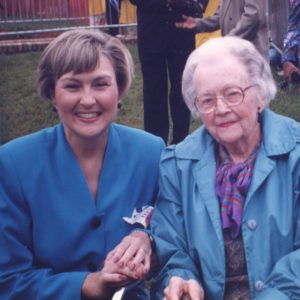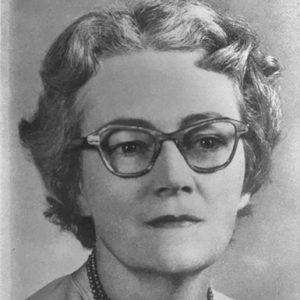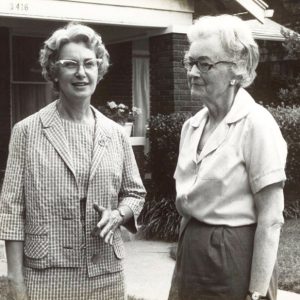calsfoundation@cals.org
Elizabeth Paisley Huckaby (1905–1999)
Elizabeth Paisley Huckaby, who served as an instructor of English for thirty-nine years, was vice principal for girls at Central High School in Little Rock (Pulaski County) during the desegregation of Central High School. The author of Crisis at Central High: Little Rock 1957–58, Huckaby documented events within the school as the first black students, the Little Rock Nine, were admitted. Charged with protecting the six female members of the Little Rock Nine, she earned hostility and anger from segregationists within the school and in the community. She wrote her brother in October of that first year, “Things go on peacefully at school, if enforced peace is meant. The force isn’t needed for most of the children… but for the few basically violent and the few more stirred to violence by emotionalism…. [T]he leaders in school and town [are] silenced by physical threats, principally to children, and by economic boycotts.” In another letter, she wrote, “Many of our leading students would be vocal on the other side, if their parents did not restrain them, knowing the danger it might place their children in. I mean physical danger of attack, as well as verbal denunciation. The law-abiding ones are the least protected in this time.”
Elizabeth Paisley was born on April 14, 1905, in Hamburg (Ashley County) to Henry Lewis Paisley, a Presbyterian minister, and Elizabeth Merrel Paisley. She was one of five children. Huckaby once credited her parents with raising her and her siblings to look past race. “Prejudice simply wasn’t in any of our patterns,” she once said in an interview. The family moved to Texas, where Paisley attended grammar school, but later moved to Fayetteville (Washington County), where she spent her high school years. She earned a degree in education at the University of Arkansas (UA) in Fayetteville in 1926. Her strong academic record earned her a place in Phi Beta Kappa. She began work as a teacher in Fort Smith (Sebastian County), but after three years of teaching, she returned to the University of Arkansas for her master’s degree in education. At midterm in 1930, she was hired as an English teacher at Little Rock Senior High School (later known as Central High School).
Three years after her arrival in Little Rock, she married Glenn T. Huckaby, a longtime educator with the Little Rock School District. The couple had no children.
Huckaby remained a full-time teacher until 1946, when she became assistant principal, later called dean of girls. Huckaby’s duties included supervision of female students, but she continued to teach, often tenth-grade honors English.
During the 1958–59 school year—the Lost Year, when all high schools in Little Rock were closed—legislators targeted Huckaby and other teachers who had befriended the black students during the 1957–58 school year, appeared to support desegregation, or had made public statements in support of following federal court mandates. In May 1959, the segregationist Little Rock School Board members fired her and forty-three other teachers without due process. Support within the community, especially from the members of the Women’s Emergency Committee to Open our Schools (WEC) and Stop This Outrageous Purge (STOP), finally led to the recall of three segregationist board members during a recall election, and schools reopened in August 1959. After thirty-nine years of teaching, Huckaby retired in 1969.
Huckaby published Crisis at Central High: Little Rock 1957–58 in 1980. The book was based on her personal diaries, newspaper articles she saved, and school records she collected as an administrator. She did most of her writing in the summer of 1958 and more during the Lost Year. She said in 1981, “My goal was to produce a book after I retired when I couldn’t be fired.” Huckaby had attempted to find a publisher several times and was successful only after Time-Life Films Inc. began production of a made-for-television movie of her work, which first aired in February 1981. The movie was filmed in Little Rock with Central High as a backdrop, and actress Joanne Woodward played the role of Huckaby.
During her retirement, she came into possession of a collection of more than 500 letters collected by her grandmother ninety years earlier. This correspondence, spanning the years from 1857 to 1887, included the Civil War years and provided a richly detailed picture of her family centered in the small Dallas County community of Tulip. Huckaby spent more than eight months transcribing approximately 475 of the letters onto 800 typewritten pages. She published these letters in 1985, with Ethel Simpson, in a book titled, Tulip Evermore: Emma Butler and William Paisley, Their Lives in Letters 1857–1887.
Huckaby died on March 18, 1999, and is buried at Pinecrest Memorial Park in Saline County. At the time of her retirement in 1969, the Arkansas Gazette said she was “probably as much as any member of the school staff… the object of vilification by the segregationist forces in the 1957 and later school desegregation crises, and conversely a champion of the forces of law and order.”
For additional information:
“Elizabeth Huckaby.” Character Collection, University of Arkansas at Little Rock Center for Arkansas History and Culture. https://ualrexhibits.org/characters/central-high-crisis-elizabeth-huckaby-1/ (accessed May 18, 2023).
Elizabeth Huckaby Papers. Center for Arkansas History and Culture. University of Arkansas at Little Rock, Little Rock, Arkansas.
Elizabeth Paisley Huckaby Collection, 1957–1978. Special Collections. University of Arkansas Libraries, Fayetteville, Arkansas.
Gordy, Sondra. “Teachers of the Lost Year: Elizabeth Huckaby.” Torreysen Library Special Collections. University of Central Arkansas, Conway, Arkansas.
———. “Teachers of the Lost Year: Little Rock School District 1958–59.” Ph.D. diss., University of Arkansas at Little Rock, 1996.
———. “Through a Heroine’s Eyes: Elizabeth Huckaby and the ‘Lost Year.’” Arkansas Historical Quarterly 67 (Summer 2008): 141–167.
Haines-Saine, Renee.“Gun Cabinet Guarded ’57 Account.” Arkansas Gazette. October 12, 1981, p. 1C.
Huckaby, Elizabeth. Crisis at Central High, Little Rock, 1957–58. Baton Rouge: Louisiana State University Press, 1980.
Lewis, Bill. “Mrs. Huckaby, Central Stalwart During Its Greatest Trials, Retires as Dean of Girls.” Arkansas Gazette. June 12, 1969, p. 10A.
———. “Treasure Trove of 550 Letters Documents 19th Century Life.” Arkansas Gazette. March 13, 1983.
Sondra Gordy
University of Central Arkansas
 Gordy and Huckaby
Gordy and Huckaby  Elizabeth Huckaby
Elizabeth Huckaby  Woodward & Huckaby
Woodward & Huckaby 



My father, Robert J. Williams, was born in Keyport, New Jersey, April 23, 1919. His father, Jewell Williams, was a traveling electrician/salesman/inventor; this gave my father a nomadic boyhood until the family eventually settled in Little Rock, Arkansas. He attended Central High School in Little Rock. As a senior, he was inspired to go to Annapolis by his English teacher, Mrs. Elizabeth Huckaby. Mrs. Huckaby let my father take home and read the latest edition of National Geographic that she had in her classroom, knowing that he had early goals of becoming a naval officer. This 1936 edition had a lengthy story about the Naval Academy at Annapolis, Maryland. This National Geographic was also the first to use four colors. Mrs. Huckaby would later become well known for her desegregation involvement at Central High in Little Rock. She was later portrayed in a movie by actress Joanne Woodward regarding the desegregation movement of 1950s and 60s. Joining the U.S. Navy in 1937 at the age of seventeen, my father would eventually be accepted into the Naval Academy. He graduated from the academy in 1942, a year early, due to the war. Forty-five years after borrowing the National Geographic from his English teacher, my father and my mother strolled into a used bookstore in Long Beach, California. After looking through the old National Geographic magazines, my father stumbled across the same 1936 edition with the story on Annapolis. After purchasing the magazine and returning home, my father sat down to look and read through it like he did almost a half a century earlier. When he glanced at the top of the front cover, he saw printed in pencil the name “Mrs. Huckaby.